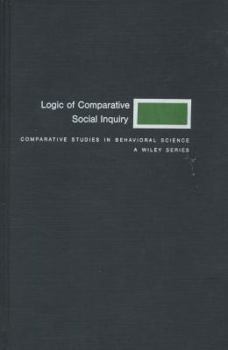The Logic of Comparative Social Inquiry
Select Format
Select Condition 
Book Overview
The purpose of this book is to identify problems encountered in one area of social scientific inquiry and to offer some solutions to them. But the identification of problems is not independent of the... This description may be from another edition of this product.
Format:Hardcover
Language:English
ISBN:0471701424
ISBN13:9780471701422
Release Date:January 1970
Publisher:John Wiley & Sons
Length:153 Pages
Weight:1.05 lbs.
Customer Reviews
2 ratings
The Best Way to Understand Cross-National Comparisons
Published by Thriftbooks.com User , 23 years ago
The Logic of Comparative Social Inquiry, altho two decades old, stands out as fresh and relevant as it has always been for people -- policy makers, involved citizens, as well as researchers, who want to do, make, or understand cross-national comparisons. Although Note: their approach is by no means limited to the comparison of different countries. Comparisons across the 50 U.S. states also benefit from much of what the authors present (not so much about linguistic/foreign language equivalence, which is a different issue with which they deal).The easiest way to describe the value of Przeworski and Teune's insights is to see how cross-national country studies can be used to emulate the experimenter's scientific approach to finding pattterns. The experimenter can "hold other variables constant" through statistical means or the selection of people or cases to study. When looking at countries (or U.S. states) a selection of "cases" can be fashioned that emulates in different kinds of experimental controls. In particular the authors describe a pair of strategies: The Most Different Nation and the Most Similar Nation strategies. In the Most Different model the analyst selects cases (countries) which are known to be very different from one another: e.g., Korea, Australia, Germany, Ecuador, South Africa.... This model is best for the generation of hypotheses because one assumes that the variable of interest will vary widely across the different countries. On the other hand the Most Similar model is best for hypothesis testing, and it is here that the "hold constant" idea is seen: Sweden, Norway, Denmark are similar enough on many key variables, so that those variables are in a sense "held constant". Or Australia, New Zealand, Canada, UK -- for linguistic purposes. etc.These models become even more valuable with the 50 U.S. states because there are many more opportunities to use demographic, economic, and historical variables in the selection of Most Different or Most Similar cases.The book is well worth the investment of money and time for any who want to use the Nations of the world of the States of U.S. to explore or test questions and hypotheses about processes and linkages that are directly amenable to usual scientific analysis.
here are the foundations
Published by Thriftbooks.com User , 24 years ago
This is what you need to read if you want to do quality social research. The authors provide a systemic overview of the possible levels of analysis. To be sure, of all my M.A. Program in Political Science, there is only one book that I marked up, this is it. It is worth the effort.




